Community / Land projects / RVO Insurance Conv. Additional N&M
RVO Insurance Conv. Additional N&M

€0
03/20 - 12/20
Completed
This project is part of
Implementing Organisations
Donors
Data Providers
General
The objective of the covenant is described in Chapter 1: The covenant focuses on the conduct of responsible investment policy by Insurers because of the international nature of this activity. This involves preventing, limiting and, if necessary, remedying as far as possible any negative impact on people, animals and the environment. This project supports the efforts of NGOs in realising concrete, implementing activities arising from their participation in the various working groups; for details see section 1.4. NB: Participation in the working groups by NGOs is already funded from the already approved Pillar 2 funding of RFO. Working Group 1: Thematicframeworks have been jointly developed by the Parties. These five thematic frameworks will be rolled outby means of joint activities (e.g. the active promotion and explanation of) for the purpose of implementation by the insurers. The activities of this working group contribute to preventing, mitigating and remedying negative impacts on specific themes explicitly included in the aforementioned article of the Covenant, namely: animal welfare, children's rights, land rights, climate change and controversial weapons and controversial arms trade. Working Group 2: Each year the parties will select a theme for further cooperation in the context of 'do good'. For the year 2020, the covenant parties have chosen the theme of 'access to medicine'. Access to medicine is a direct part of the 'right to health' (International Covenant on Economic, Social and Cultural Rights; Article 12) is in line with SDG 3: ensuring good health and well-being for everyone at all ages. It is of great importance that pharmaceutical companies worldwide, including explicitly in developing countries and emerging economies, corporate socialresponsibility, in line with the OECD guidelines and the UNGPs, with regard to this right to health. Workgroup 4: On the basis of fictitious and existing cases, the parties investigate how insurers can contribute to recovery and redress and how they can organise their commitment as optimally as possible in order to achieve a real positive impact 'on the ground'. Working with existing cases, among others, provides a clearer picture of possible negative impacts of specific investments and best practice on how these negative impacts can be prevented and limited. In 2020, this working group will, among other things, organise a case session on 'Recovery and Story'. The proceeds of this case session (in the form of lessons learned) will be published. Working Group 5: In the coming year, the parties will start investigating the possibilities for improving transparency and reporting by insurers. Transparency is important for compliance with the OECD guidelines and UNGPs and the dialogue with internal and external stakeholders. In order to collaborate effectively with others, it is also important to provide insight into results achieved and challenges in the area of ESG due diligence. Finally, public disclosure of results and ambitions can serve as a good stimulus to continue to improve ESG due diligence structurally. The independent monitoring committee, which monitors the progress of the agreements made in the Covenant, endorsed transparency as an important part of the Covenant. - Save the Childrencontributesknowledge about children's rights in a broad sense, including child labour, nutrition and health care. Because of this expertise, they contribute to working group 1, 2 and 4. - Oxfam Novib contributes knowledge on gender equality, land rights, access to medicines, climate change, fair taxation and the fight against corruption. Because of this expertise they contribute to all working groups. - Pax for Peace contributes knowledge about controversial weapons and arms trade, protection of civilians in war situations, advocacy for victims of human rights violations and natural resources in relation to conflict and human rights. Because of this expertise, they contribute to working groups 1, 4 and 5. - Natuur en Milieu contributes knowledge about climate change, sustainable energy sources, sustainable food and sustainable use of raw materials. Because of this expertise they contribute to working group 1....- World Animal Protection contributes knowledge on animal welfare, also in relation to nature conservation, biodiversity, the protein transition, sustainable food production and climate change. Because of this expertise they contribute to workgroups 1, 4 and 5.




